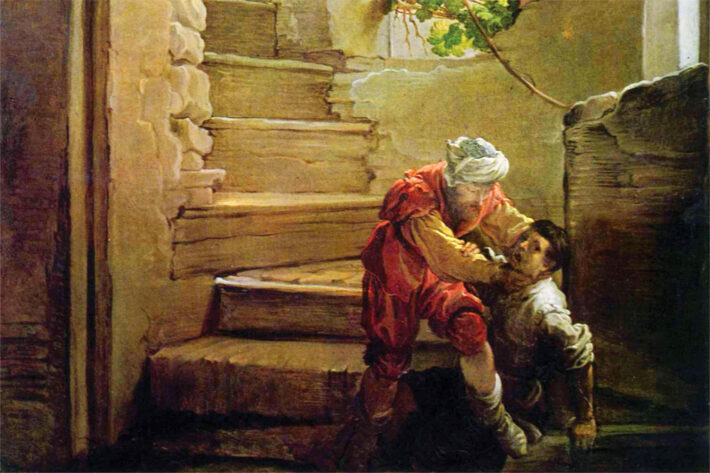Christian Art | Parables Of Jesus | Parable Of The Unforgiving Servant | Love Revealed By Jesus Christ
Matthew 18: 21-35, 19: 1 | King James Audio Bible | KJV | King James Version
21 ¶ Then came Peter to him, and said, Lord, how oft shall my brother sin against me, and I forgive him? till seven times?
22 Jesus saith unto him, I say not unto thee, Until seven times: but, Until seventy times seven.
23 ¶ Therefore is the kingdom of heaven likened unto a certain king, which would take account of his servants.
24 And when he had begun to reckon, one was brought unto him, which owed him ten thousand talents.
25 But forasmuch as he had not to pay, his lord commanded him to be sold, and his wife, and children, and all that he had, and payment to be made.
26 The servant therefore fell down, and worshipped him, saying, Lord, have patience with me, and I will pay thee all.
27 Then the lord of that servant was moved with compassion, and loosed him, and forgave him the debt.
28 But the same servant went out, and found one of his fellowservants, which owed him an hundred pence: and he laid hands on him, and took him by the throat, saying, Pay me that thou owest.
29 And his fellowservant fell down at his feet, and besought him, saying, Have patience with me, and I will pay thee all.
30 And he would not: but went and cast him into prison, till he should pay the debt.
31 So when his fellowservants saw what was done, they were very sorry, and came and told unto their lord all that was done.
32 Then his lord, after that he had called him, said unto him, O thou wicked servant, I forgave thee all that debt, because thou desiredst me:
33 Shouldest not thou also have had compassion on thy fellowservant, even as I had pity on thee?
34 And his lord was wroth, and delivered him to the tormentors, till he should pay all that was due unto him.
35 So likewise shall my heavenly Father do also unto you, if ye from your hearts forgive not every one his brother their trespasses.
1 AND it came to pass, that when Jesus had finished these sayings, he departed from Galilee, and came into the coasts of Judæa beyond Jordan;
There are people who say: I forgive, but I do not forget. Why? we may ask. Of what use is this?
It is as if we were to attach a condition to our forgiveness, saying, in effect, that we forgive up to a point, but that our forgiveness is not total. Our forgiveness comes with a threat: Your crime is noted. We are really saying: we don’t forgive you all.
When Peter asks his question: How often shall I forgive? Christ answers him: Always. To say seventy times seven is synonymous with ‘always’. Indeed, where the number seven signifies perfection and ‘always’, Jesus says: seventy times always! We are called in our forgiveness to know no limit.
There is to be no reckoning. When we repent, there is no holding back of God’s forgiveness. Our forgiveness should then be absolute and without measure, just as God’s mercy is absolute and without measure.
To illustrate this truth of his mission on earth, indeed the whole point of his becoming incarnate, Jesus teaches us the parable of the unforgiving servant. As always with the parables of Jesus, the parable means to help us to become aware of a key truth of Christ’s teaching in ways which we can readily grasp and relate to our own lives – albeit we might then have to think!
The unforgiving servant owes his lord ten thousand talents. This is a vast sum of money. (A silver talent was approximately 30 Kg of silver. The money owed by the servant is, in today’s money, around half a billion dollars.) The servant begs for mercy and the lord forgives him his debt.
And so the servant goes away from his forgiveness, his absolution, by his lord, only to put into prison for a debt his fellow servant, who owes him the relatively paltry sum of a hundred denarii. (A denarii was, roughly, a day’s minimum wage.)
We know the lesson of this parable already. The Lord our God will forgive us everything. Our Father sent His only Son to die for us to forgive us our debts. God forgives us everything. This is exactly how our forgiveness of others should be.
‘But, to make those gifts acceptable, follow them up with mercy. Fasting does not germinate unless watered by mercy. When mercy dries up, fasting suffers drought, for mercy is to fasting what rain is to the earth. The man who is fasting may prepare his heart, cleanse his flesh, weed out his vices, and sow virtues. Nevertheless, if he does not sprinkle his plants with streams of mercy, he does not gather the harvest. O you who fast, when your mercy fasts, your fields fast, too. O you who fast, what you pour out in mercy comes back to you as storage in your barn.’ St Peter Chrysologus

![]()
King James Audio Bible KJV | Meditations On The Love Of Jesus Christ | King James Version
The Parable of the Unforgiving Servant is a central teaching of Jesus of Nazareth in the Christian tradition. The parable teaches the importance of forgiveness and the consequences of failing to forgive others. The parable is often associated with the larger theme of the Crucifixion of Jesus, and Jesus’ offer of salvation and the forgiveness of sins to all who believe in him.
The parable tells of a king who settles accounts with his servants and forgives a servant’s enormous debt, but is outraged when he finds out that the same servant refuses to forgive a fellow servant who owed him a much smaller debt. The king punishes the unforgiving servant, saying: ‘Shouldest not thou also have had compassion on thy fellow servant, even as I had pity on thee?’ (Matthew 18:33 KJV)
The message of the parable is clear: just as the king showed mercy and forgiveness, Christians are called to extend that same forgiveness to others. This is reinforced in Jesus’ teachings in the Sermon on the Mount, where he says: ‘For if ye forgive men their trespasses, your heavenly Father will also forgive you: But if ye forgive not men their trespasses, neither will your Father forgive your trespasses.’ (Matthew 6:14-15 KJV)
The Christian Cross is sign of the sacrifice made by Jesus on the Cross and the forgiveness available to all through faith in him. Christian prayer and the celebration of the Passion of the Christ guide Christian worship to the forgiveness of sin offered by Jesus. Our prayer for forgiveness is understood to be as one with our capacity to forgiver in the Lord’s Prayer – the Our Father.
The Parable of the Unforgiving Servant relays an important message concerning the nature of God and God’s grace in the economy of salvation. As we pray with Jesus, as it were with Jesus in the Garden of Gethsemane, so we are called as the prodigal son to discover the utmost humility and ask God to take us home.
Even when individually and as societies we may have squandered so much of our riches, our spiritual gifts and our Earthly home, still as the prodigal son we are called to receive God’s free gift of mercy which is infinite.








